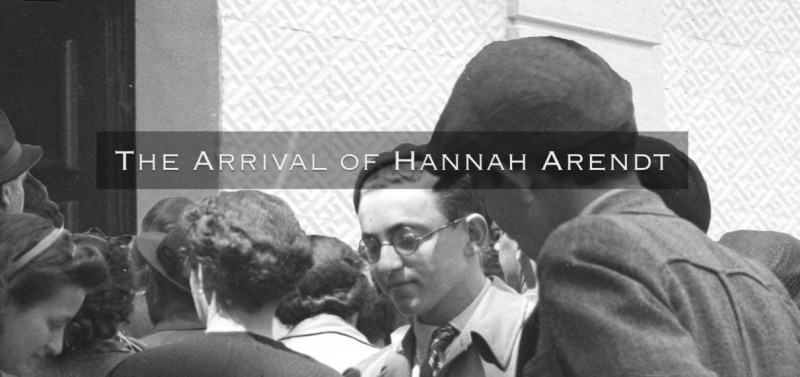
The Arrival of Hannah Arendt
This film describes the arrival of Hannah Arendt - a Jewish, German-American political theorist and publicist - in New York and her reflections on flight and helping people start over.
…Und ich habe fast 5 Jahre gearbeitet, aufgebaut und in wirklicher sozialer Arbeit Kraft und Zeit und Liebe verschwendet, um nach dem Umsturz im April 1933 einen kurzen Brief zu bekommen, daß ich gebeten werde, meine Tätigkeit bis auf weiteres einzustellen. Kein Nazi-Arzt fand sich bereit, meine Tätigkeit fortzusetzen ohne Bezahlung wieso denn? „Solche Sauarbeit mache ich nicht”, diese Äußerung eines Nazikollegen, der zu meinem Nachfolger ausersehen war, ist mir wörtlich zugetragen worden. Was bedeutete es mir? Alles, was ich geschaffen hatte, war zerstört, meine armen Frauen-wer wird sich jetzt um sie kümmern?
…And I have worked for almost 5 years, built up and wasted strength and time and love in real social work, only to receive a short letter after the NS-seizure of power in April 1933 that I was asked to stop my activity until further notice. No Nazi doctor was willing to continue my work without payment – why?” I don’t do that kind of bastard work”, this statement of a Nazi colleague, who was chosen as my successor, has been told to me verbatim. What did it mean to me? Everything I had created was destroyed, my poor women-who will take care of them now?”
Hertha Nathorff, née Einstein (1895-1993) was a German pediatrician, psychotherapist and social worker, she published several works, including a book of poems. She was born in Laupheim (Baden-Württemberg) into a Jewish family. She was related to the physicist Albert Einstein, the musicologist and music critic Alfred Einstein, and the film producer Carl Laemmle. Nathorff attended high school in Ulm and, interrupted by a temporary job as a nurse during World War I, studied medicine in Munich, Heidelberg, Freiburg (Breisgau) and Berlin from 1914. After receiving her doctorate degree in Heidelberg (1920) and years as an assistant in Freiburg, she was a senior physician at the Red Cross Women’s and Children’s Home in Berlin-Lichtenberg from 1923-28, then worked in private practice and simultaneously at the Charlottenburg Hospital as head of the family and marriage counseling center. In the course of National Socialist racial policies, she lost her medical license in the fall of 1938, while her husband, formerly a senior hospital doctor in Berlin-Moabit, was granted a license for exclusively Jewish patients. During this period she worked as his receptionist.
Threatened with death in Nazi Germany, she organized emigration with the help of American relatives from November 1938, sending her 14-year-old son ahead to England on a Kindertransport. In April 1939 the couple managed to leave the country for London, and in early 1940 they continued their journey to New York. In New York she worked as a nurse, maid, bar pianist and kitchen help to support the family – a typical fate of women in exile. She remained a physician’s assistant in her husband’s practice, which opened in 1942 – she did not have the time and money to get her degree recognized.
Hertha Nathorff took a very active part in the social life of the German-speaking exile community: she organized courses for emigrants in nursing and infant care and cultural events, was the founder of the Open House for the elderly, chairwoman of the women’s group, and an honorary member of the presidium of the New World Club. In the excerpts from the diary of Hertha Nathorff Berlin-New York Aufzeichnungen 1933 bis 1945, which we show in our archive, the author deals with her initial problems, disappointments and mortifications in the New World. She reports on the everyday life of emigrants, on the struggle for existence, on poverty and mental destruction. Despite her longing for the places of her childhood and youth, she never visited Germany again. She never really settled in America. The homesickness remained constant.
Excerpt from the diary of Hertha Nathorff, edited and introduced by Wolfgang Benz (1987): Das Tagebuch der Hertha Nathorff. Berlin – New York. Aufzeichnungen 1933 bis 1945. Schriftenreihe der Vierteljahrshefte für Zeitgeschichte, Band 54. R. Oldenbourg Verlag München, p.30.
Translation from German to English © Minor Kontor / We Refugees Archive.